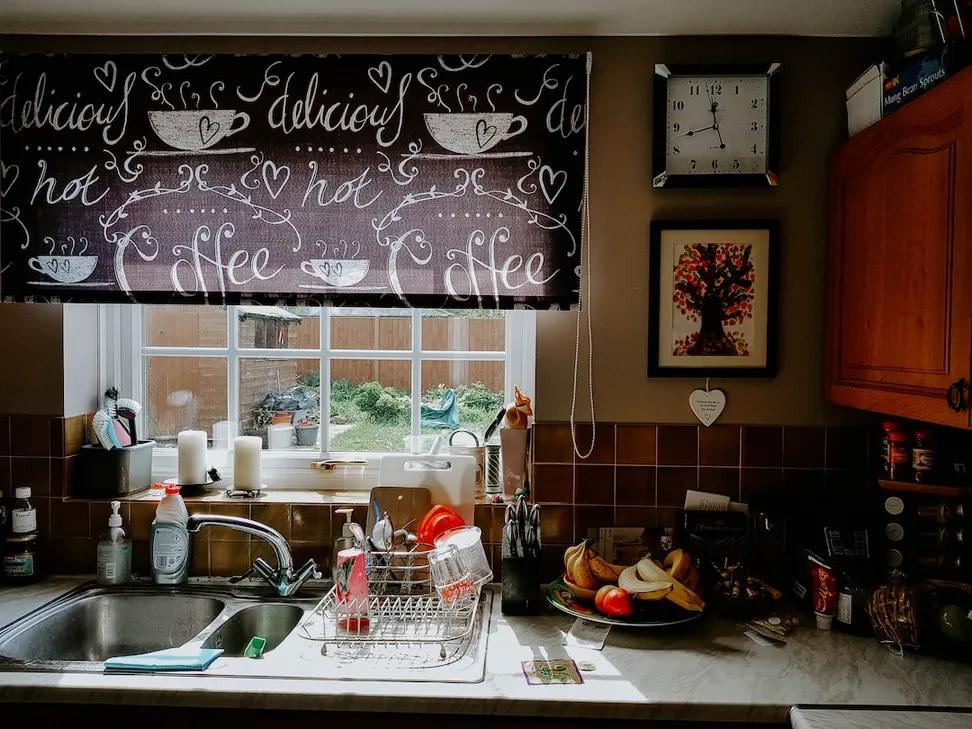Many people ask, are rusty kitchen utensils dangerous to use? The answer is yes; using rusty kitchen utensils can be dangerous as it can lead to several health issues.
Rust is a type of corrosion that can occur when metal is exposed to moisture or humidity and can contain potentially harmful bacteria and toxins. It is important to understand the risks associated with using rusty kitchen utensils and take the necessary steps to prevent the spread of contamination.
In this article, we will discuss the dangers of using rusty kitchen utensils, the associated health risks, and how to keep your kitchen utensils free from rust.
Are Rusty Kitchen Utensils Dangerous?
Rusty kitchen utensils can be dangerous if not handled properly. Rust is an iron oxide that forms on metal when exposed to oxygen and moisture. As metal oxidizes, it weakens, making it more susceptible to breakage and corrosion. Rust on kitchen utensils can also harbor bacteria, leading to food-borne illnesses when food comes into contact with the utensils.
Rusty utensils can also be a hazard when using them for cooking. Rust can flake off the utensil and become embedded in food, which can be a choking hazard and lead to food contamination. If a utensil is rusty, it should be discarded immediately, as it is unsafe.
When cleaning kitchen utensils, it is important to inspect them for rust regularly. If any rust is present, it should be removed immediately. The easiest way to remove rust is to scrub it with steel wool and mild detergent. If the rust is more severe, it may require a rust remover.
In some cases, kitchen utensils may not be able to be saved if they are heavily rusted. In these cases, replacing the utensils with new ones is important. It is also important to store kitchen utensils properly to prevent them from becoming rusty in the first place. This includes keeping them out of damp areas and ensuring they are completely dry before storing them.

Causes Of Rust In Kitchen Utensils
Rust is an oxidation reaction when metal is exposed to oxygen and moisture. This is a common problem in kitchens because of the high humidity and moisture levels. Kitchen utensils, such as pots and pans, are particularly vulnerable to rust because they are often made of iron or steel. Rust can cause the metal to weaken and flake off, leading to potential health risks for those who use these items.
Rust forms when iron and oxygen react with water. This reaction is accelerated when the iron is exposed to acidic substances, such as vinegar, fruit juices, and tomato sauce. Even if the utensils are not exposed to these substances, they can still be vulnerable to rust. High humidity, salt, and other minerals can also cause oxidization.
The effects of rust on kitchen utensils can be serious. Not only can rust weaken the metal, but it can also lead to the release of harmful chemicals. Ingesting these chemicals can cause serious health problems, such as stomach irritation, nausea, and vomiting. Additionally, rust can make kitchen utensils more difficult to clean since it can trap bacteria and other contaminants.
It is also important to be aware of the signs of rust on kitchen utensils. Signs to look for include discoloration, flaking, or a roughened texture. If these signs are present, the utensil should be discarded and replaced with a new one. Using rusty utensils can lead to serious health risks, so taking the necessary precautions to keep them safe is important.
Potential Health Risks Of Using Rusty Utensils
Using rusty kitchen utensils can be a health risk as the rust can leech into the food cooked with them. It can contain various metals and minerals, such as lead, chromium, and arsenic. Ingesting these metals and minerals can result in various health issues, including stomach upset, digestive problems, and even cancer.
Rust can also lead to the deterioration of utensils, which can cause them to break and lead to cuts and lacerations. It can also increase the risk of foodborne illnesses, such as salmonella and E. coli, as bacteria can grow in the presence of rust. This can lead to serious health problems like vomiting, diarrhea, and even death.
Preventative Measures For Keeping Utensils From Rusting
Rusty kitchen utensils can be dangerous to cook with due to the potential for contamination. Even if the utensil is only slightly rusted, it can still introduce bacteria and other contaminants into the food. This can lead to food poisoning, which can be very serious and even life-threatening. It is important to take preventative measures to stop kitchen utensils from rusting in the first place.
One of the best ways to prevent utensils from rusting is to keep them dry. It is important to wipe down all utensils after washing them, as moisture on the surface can cause them to rust. Utensils should be stored in a dry area away from moisture, such as a cupboard or drawer. It is also important to avoid leaving utensils soaking in water or exposed to any other form of moisture.
Utensils should also be cleaned regularly. Regular cleaning helps to remove any dirt or food particles that may be stuck on the utensils, which can trap moisture and lead to rusting. Utensils should also be dried thoroughly after washing, as any moisture on the surface can lead to rusting. It is also important to avoid cleaning utensils in the dishwasher, as the high temperatures can cause them to rust.
Lastly, it is important to inspect utensils regularly for any signs of rust. If any rust is found, it is important to discard the utensil immediately to avoid the risk of contamination. It is also important to avoid using any type of steel wool or abrasive cleaning materials on utensils, as these can cause them to rust.

Proper Cleaning And Storage Of Utensils To Avoid Rust
Using rusty kitchen utensils can pose a significant health risk if not managed properly. Rust can cause food poisoning, containing bacteria, fungi, and other harmful microorganisms.
This is why it is important to take the necessary steps to prevent utensils from rusting in the first place. Proper cleaning, storage, and maintenance of kitchen utensils can help to reduce the risk of rust and keep you and your family safe.
- The first step to avoiding rust is always cleaning your utensils thoroughly after each use. Use hot, soapy water and a scrubber to remove any food particles or dirt, and then rinse the utensil with clean water. You should also dry the utensils completely before storing them away. Allowing them to air dry can help, but it is also important to dry them with a kitchen towel to remove all water.
- Once the utensils are clean and dry, the next step is to store them in a dry place. Storing them in a cupboard or drawer with a lid is best, as this will help keep moisture out. If you are storing them in a plastic bag, make sure to use a bag designed for kitchen utensils, as this will also help keep moisture out.
- Finally, it is important to inspect your utensils for signs of rust regularly. If you notice any signs of rust, it is important to immediately clean and dry the utensil and then replace it if necessary.
How To Remove Rust From Utensils?
Rust is a common problem in the kitchen, and rusty kitchen utensils can be a health hazard if improperly handled. There are several ways to remove rust from utensils, and it is important to understand the best and most effective methods to ensure your kitchen is safe.
- The first step to removing rust from utensils is to soak them in white vinegar and water. This will help loosen the rust from the utensils and make it easier to scrub away. After soaking for a few hours, use a steel wool pad to scrub away any remaining rust. If the rust is particularly stubborn, you may need a wire brush to get the job done.
- A commercial rust remover is another method to remove rust from utensils. These products are generally safe to use, but it is important to follow the directions carefully to ensure safety. Additionally, these products may not be suitable for certain materials, so check the labels before using them.
Once the rust is removed, dry the utensils thoroughly and re-season them with a light coating of cooking oil. This will help prevent the utensils from rusting again in the future.
Choosing The Right Utensils To Avoid Rust
When it comes to choosing the right kitchen utensils, safety should be a top priority. It is important to choose kitchen utensils that are made from materials that are rust-resistant and long-lasting.
Stainless steel is one of the best materials for kitchen utensils because it is rust-resistant and can withstand a lot of wear and tear. It is also easy to clean and disinfect, which helps prevent the spread of bacteria and germs.
Utensils made of plastic, wood, and other materials can also be used, but they should be checked regularly for signs of rust. If any rust is found, the utensils should be replaced immediately.
It is also important to keep kitchen utensils clean and dry. After each use, they should be washed in hot soapy water and dried with a clean cloth. Utensils should never be left in water or put in the dishwasher. Storing utensils away from moisture will help prevent the formation of rust.

Alternatives To Metal Utensils
Using rusty kitchen utensils can be dangerous for many reasons. Rust can easily transfer to food and can cause serious health risks. Eating food contaminated with rust can lead to food poisoning, gastrointestinal issues, and even infections.
In addition, the presence of rust can affect the flavor of the food and can make it taste unpleasant. As a result, it is important to avoid using rusty kitchen utensils and to replace them as soon as they become rusty.
Fortunately, there are many alternatives to metal kitchen utensils that are easy to obtain and use.
- Wooden utensils are a great option, as they are less likely to rust and are durable enough to last for years.
- Silicone utensils are also popular and can be used in many ways. They are heat-resistant, non-stick, and easy to clean, making them great for cooking and baking.
- Bamboo utensils are the way to go for those looking for a more eco-friendly option. Bamboo is a renewable resource and is incredibly sustainable. It is also naturally anti-bacterial and anti-fungal, making it a safe option for food preparation. Bamboo utensils are also lightweight and easy to use, making them great for everyday use.
- Plastic utensils are an option as well. While plastic utensils are not as durable as other materials, they are extremely affordable and easy to clean. Plastic utensils are also available in various colors and styles, making them a great choice for those looking to add style to their kitchen.
Is Rust Dangerous To Breathe?
Whether rust is dangerous to breathe is a valid concern for many people. Rust, or ferric oxide, is a type of corrosion that occurs on metal surfaces exposed to air and water. Rust occurs when iron and oxygen mix, forming a reddish-brown coating on the metal surface. This coating comprises microscopic particles that, if inhaled, can be hazardous to human health.
Most kitchen utensils, such as knives, forks, and spoons, are made of metal and are, therefore, more susceptible to rust. Over time, these utensils can become rusty, and this rust can flake off or break off into tiny particles, which can be inhaled.
Inhaling these particles can cause various health issues, such as throat, nose, and eye irritation, coughing, wheezing, and difficulty breathing. In extreme cases, long-term exposure to rust particles can even cause lung cancer.
Is Cooking With A Rusty Pan Bad?
Cooking with rusty kitchen utensils can be a dangerous practice, as rust is made up of iron oxide, a by-product of the oxidation of iron. Rust can potentially cause serious health problems if ingested, as it can contain heavy metals such as lead, chromium, and nickel. In addition, rust can also cause corrosion to kitchen utensils, leading to their deterioration over time.
When cooking with a rusty pan, there is a risk that the rust can flake off into the food and be ingested. This can be especially dangerous for young children, who are more vulnerable to the effects of heavy metals than adults. Ingesting rust can cause serious gastrointestinal issues, such as nausea, vomiting, and abdominal pain.
What Happens If You Accidentally Eat Rust?
Using rusty kitchen utensils can be a potential health hazard. While rust is not toxic, it can contain traces of environmental toxins, including lead, arsenic, and cadmium. Therefore, it is important to be aware of the dangers of using rusty kitchen utensils and take precautions to ensure your safety.
One of the most concerning risks of using rusty kitchen utensils is accidentally consuming rust particles. Ingesting rust particles can cause gastrointestinal irritation and nausea. It can also cause a person to develop anemia, as rust can bind to the iron in the body. In extreme cases, consuming rust particles can lead to iron buildup in the body and cause liver damage. Therefore, it is important to avoid accidentally ingesting rust particles.
It is also important to know the other potential risks of using rusty kitchen utensils, such as cuts and abrasions. Rusty kitchen utensils can cause cuts and abrasions to the skin if they are not handled properly. Therefore, it is important to wear protective gloves when handling rusty utensils and to discard any utensils that are too rusty to be safely used.
Can You Get Tetanus From Eating Rust?
One of the most common concerns associated with rust is the possibility of contracting tetanus. Tetanus is a serious infection caused by bacteria that can enter the body through a wound and cause symptoms such as painful muscle contractions, difficulty breathing, and even death. Although it is not likely to happen, it is possible to contract tetanus if you consume food prepared with rusty kitchen utensils.
Rust can be found on the surface of utensils or in the food itself, and it can be ingested when it is swallowed. It is important to note that even if you do not consume the rust directly, there is still a chance of contracting tetanus if the utensil is used to prepare food that is then consumed.
The best way to prevent tetanus from rusty kitchen utensils is to replace them with new ones. Inspect your utensils for any signs of rust before you use them. If you find any rust, dispose of the utensil immediately and replace it with a clean one. Also, wash all your utensils thoroughly with hot, soapy water before you use them. This will help to remove any rust particles that could be present.
In addition to replacing rusty utensils, it is also important to practice proper hygiene when handling food. Make sure to wash your hands before and after handling food and using any kitchen utensils.
Also, it is important to store food properly to avoid contamination. This includes keeping food at the right temperature, using clean containers, and avoiding cross-contamination by using separate cutting boards for raw and cooked food.
Conclusion
In conclusion, using rusty kitchen utensils can be dangerous due to the potential for contamination from metal particles and bacteria. Inspecting kitchen utensils regularly and replacing any rusty or showing signs of wear is important. Paying attention to the condition of kitchen utensils can help to ensure that meals are prepared safely and can help to prevent the spread of food-borne illnesses.
Frequently Asked Questions:
Is rust on a spoon dangerous?
It depends on the type of rust and how severe it is. In some cases, rust on a spoon might not be dangerous, but in other cases, it could be a sign of a more serious problem. It is best to check with a doctor or health professional if you have any concerns about the safety of the spoon.
Can you get sick using rusty utensils?
Yes, you can get sick using rusty utensils. Rust can contain bacteria and other organisms that can cause illness if ingested. This can lead to gastrointestinal problems. Additionally, rusty utensils may contain bacteria, which can cause food poisoning or other health issues. Finally, using rusty utensils could result in cuts or scrapes, leading to infection.
Is it safe to cook on rusty cookware?
No, it is not safe to cook on rusty cookware. Rust is a type of corrosion that can create flakes and particles that can get into food and be harmful if ingested. It is best to replace any cookware that has rust on it.
Are all kitchen utensils at risk of rusting?
No, not all kitchen utensils are at risk of rusting. Some materials, such as stainless steel, are rust-resistant and do not rust in water. Other materials, such as cast iron, are highly prone to rusting if not properly maintained.
How can I tell if my kitchen utensils are rusty?
To check if your kitchen utensils are rusty, look for signs of rust on the surface, such as discoloration, flaking, or a powdery residue. You may also be able to feel the rust with your fingers.
What can I do to prevent my kitchen utensils from rusting?
You can do several things to prevent your kitchen utensils from rusting. Such as drying them thoroughly after washing, avoiding leaving them in water for too long, using stainless steel or non-stick utensils, and storing them in a dry place. These tips can help extend the life of your utensils.
